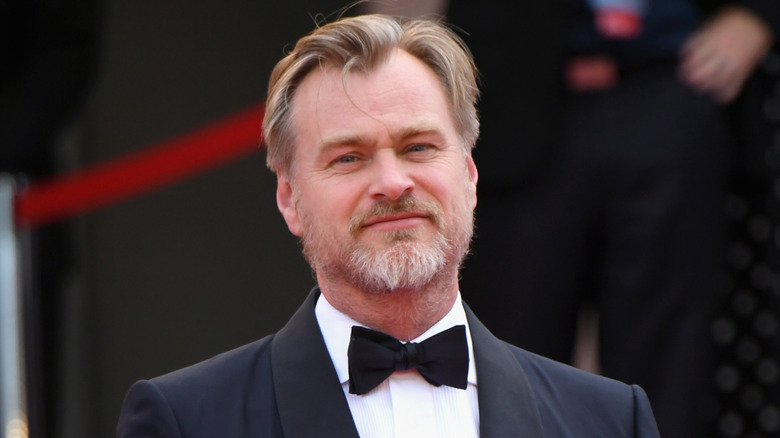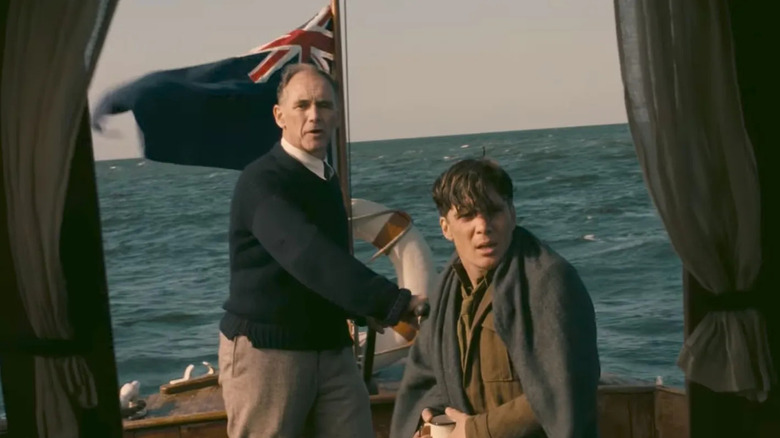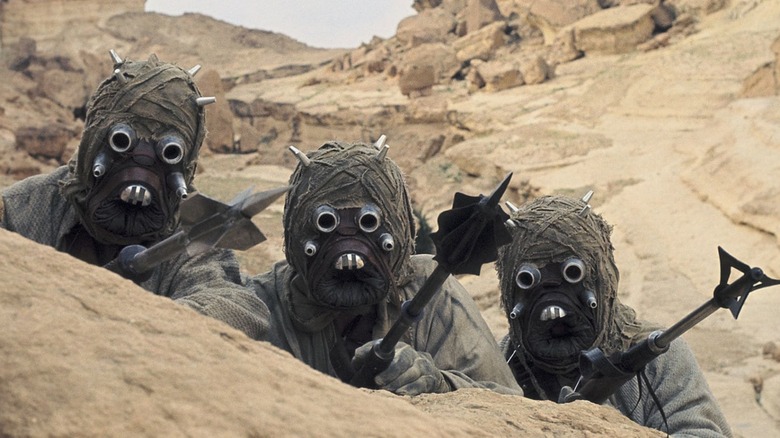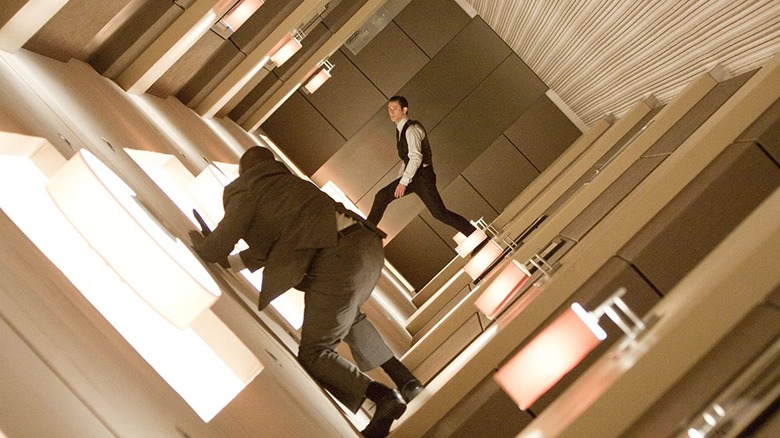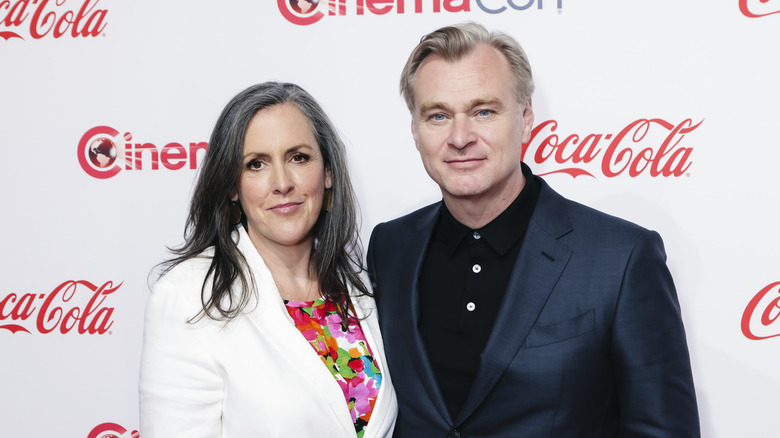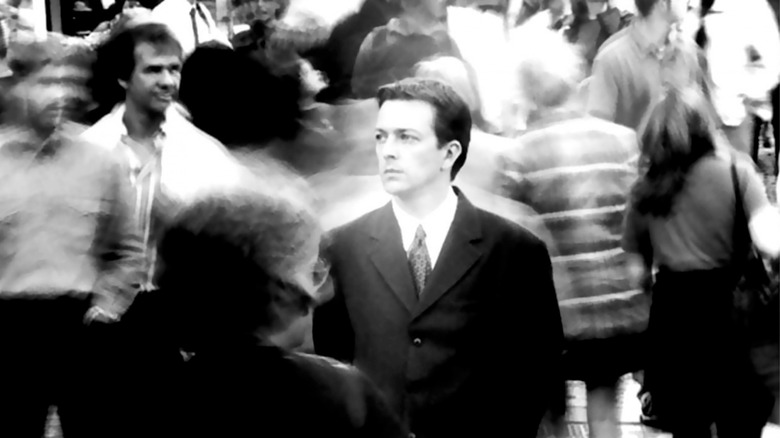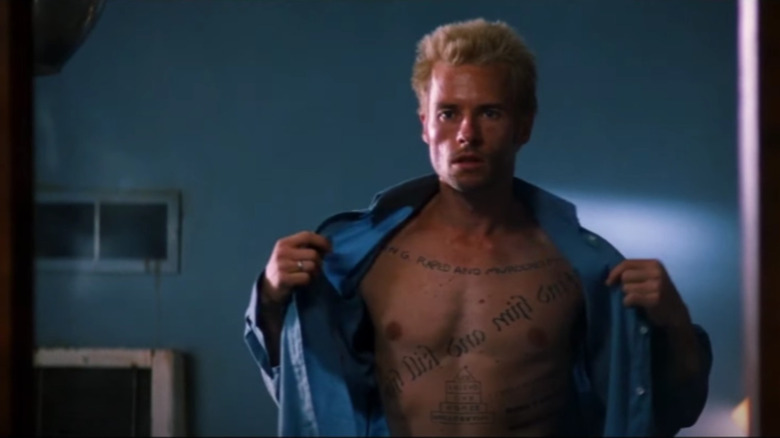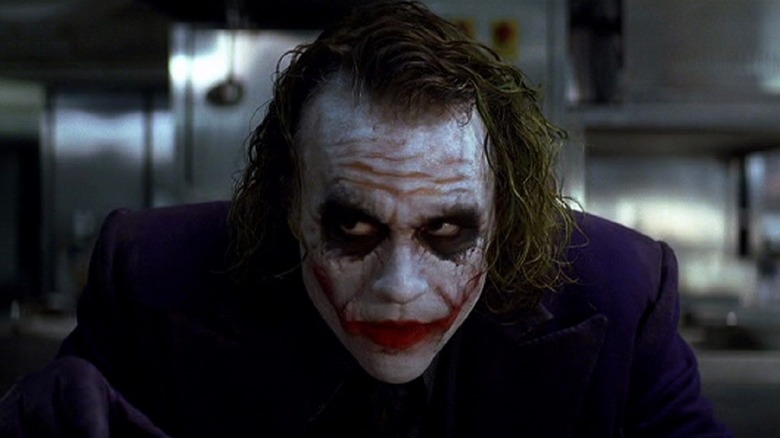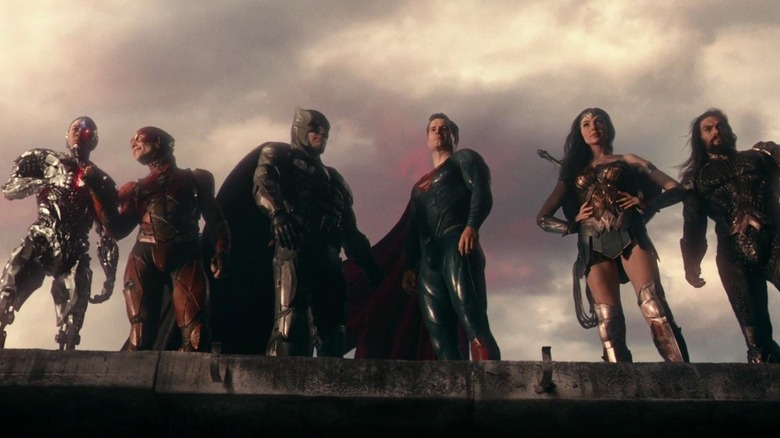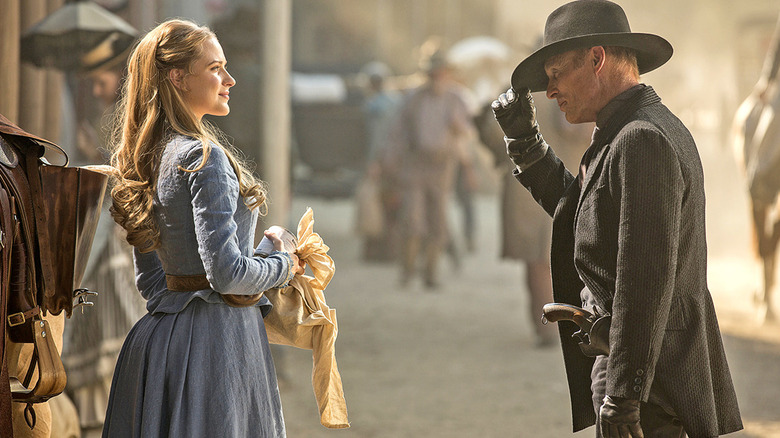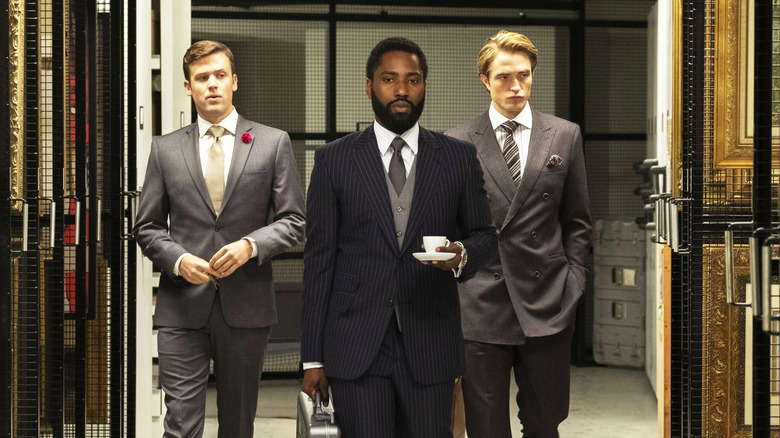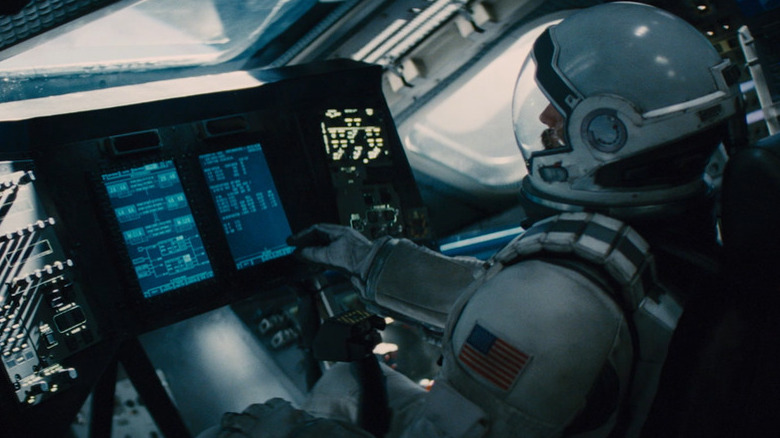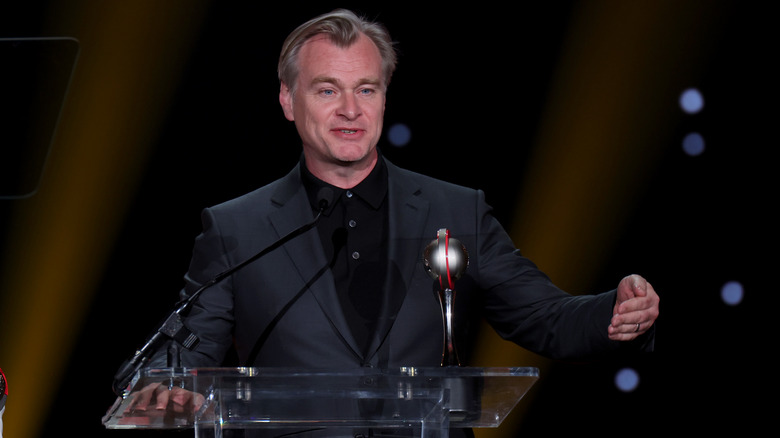The Untold Truth Of Christopher Nolan
Fans of Christopher Nolan could describe him the same way they could describe his movies. On the surface, he can appear to be cerebral, intense, meticulous, mysterious, and occasionally impossible to interpret — particularly since he's averse to doing too many interviews and prefers to keep his private life just that. But he's also a simplistic and down-to-earth family man and a lover of popular entertainment who just happens to be one of the most famous directors on the planet. In other words, the 52-year-old filmmaker is something of an enigma and a bit of a contradiction.
Many of Nolan's movies are beloved by cinephiles and general audiences alike. He's managed to retain his reputation as a favorite of a certain subset of film Twitter while also being one of the few remaining star-in-his-own-right directors who can open adult-oriented, big-budget, original work in IMAX. That's because, though his films aren't necessarily the warmest and fuzziest or most fun to watch, they're always cinematic, thought-provoking, and engaging.
Nolan belongs to a rarified class of filmmakers who are closely associated with their instantly recognizable authorial styles. So, how did the man behind the disorienting plots, dazzling practical effects, and dapper suits become the Christopher Nolan? The story is more straightforward and relatable than you might suspect.
He has dual citizenship
Christopher Nolan might seem exceedingly British to the casual observer. He was born in London, speaks with an English accent, and went on to make "Dunkirk," a film about the critical World War II battle told from the perspective of the Brits stranded upon French shores. It just so happens to be the highest-grossing WWII movie of all time.
But Nolan is only half-British. While his father, Brendan, hailed from the U.K., his mother, Christina, was American. Because of this, Nolan and his two brothers, Matthew and Jonathan, have dual citizenship in the United Kingdom and the United States of America, and the family split their time between London and Chicago. In fact, though they grew up together, Christopher and Jonathan sound like they were raised an ocean apart, as Jonathan speaks with a distinctly American accent.
The acclaimed auteur director prefers some things about his home on the other side of the Atlantic. When he began trying to make movies, he had trouble establishing himself within the U.K.'s film industry. Nolan told The Guardian that it was "a very clubby kind of place," with little opportunity and funding for newcomers. Hollywood, he felt, was more open to fresh talent and ideas. Perhaps it's no surprise, then, that Nolan and his own family have settled in and worked out of the very same Hollywood Hills compound where he got his start.
Star Wars made him want to be a director
George Lucas' game-changing blockbuster, "Star Wars: Episode IV – A New Hope," became an important touchstone to millions of new fans upon its release on May 25, 1977 — one of them was seven-year-old Christopher Nolan. In a conversation with fellow director, Bennett Miller, at the 2015 Tribeca Film Festival, Nolan said that "Star Wars" made him want to be a filmmaker ... and he didn't wait very long to get started. "I would make these imaginatively titled little science fiction films with a Super 8 camera, called 'Space Wars,'" he recalled. "I recently transferred them to DVD, to watch them with my children, and I was surprised to realize how bad they are."
The 2018 book, "Christopher Nolan: A Critical Study of the Films," explains how Nolan and his brother, Jonathan (who was only two years old at the time), would use action figures as stop-motion characters and built sets out of household items like flour, egg cartons, and toilet paper rolls. Does that mean Nolan could be in the running to helm future "Star Wars" projects?
Though most of his films are original stories, he has worked within the machine of a massive franchise before. Alas, when asked if he'd have been interested in directing "The Force Awakens," Nolan told The Daily Beast, "As far as whether or not I would have ever done it, the truth is I think I'd be afraid to touch it!"
His fascination with time began with pulp novels
Christopher Nolan is arguably best known for the way he manipulates time and perspective to some extent in his projects. His signature storytelling style — nonlinear and often told through the lens of unreliable narrators — dates all the way back to his earliest work. Nolan's short films, "Doodlebug" and "Tarantella," play with memory and point-of-view in much the same way that later features like "Insomnia," "Inception," and "Tenet" do in order to build suspense and create mystery.
Nolan may have made such narrative tricks his calling card, but those techniques have long been used in detective novels to obscure the truth from the reader until it's time for the reveal, and the director has been a fan of crime fiction since at least his teenage years. "When I was 16 I read a Graham Swift novel, 'Waterland,' that did incredible things with parallel timelines, and told a story in different dimensions that was extremely coherent," he recounted in an interview for the DGA Quarterly in 2012.
But, though Nolan is a writer, his ultimate page is the screen, and he learned how to manipulate time and perspective visually from some seminal films released in the '70s, '80s, and '90s, including "Blade Runner," "The Wall," "The Man Who Fell to Earth," "Performance," and "Pulp Fiction." He wound up with a copy of Quentin Tarantino's script of "Pulp Fiction" before the actual film premiered and was impressed by its out-of-sequence seven-act structure.
He met his longtime wife and producer in college
Despite experimenting with his parents' camera throughout his childhood, when the time came to choose a college major, Christopher Nolan didn't go to film school. Instead, on his father's advice, he decided to study English literature at University College London. But that doesn't mean he stopped loving — or making — movies.
"Studying English literature got me thinking about the narrative freedom that authors have enjoyed for centuries," Nolan told The American Society of Cinematographers. "It seemed to me that filmmakers should enjoy those freedoms as well." Former alumnus, Matthew Tempest, gave The Guardian some insight into Nolan's college days. Though it wouldn't be on his diploma, Nolan chose UCL specifically because it had a film studio complete with a Steenbeck editing suite and 16mm cameras. There was also a screening room, and as president of the UCL Film Society (Tempest was secretary) a young Nolan got to program showings of some of his favorite films. The admission charges funded his own work.
UCL ended up being the right choice for Nolan, for personal and professional reasons. He met his longtime wife and producing partner, Emma Thomas, on his first day at university. Thomas lived in his building and also became a member of the Film Society. She continues to produce his movies to this day (she's involved in every step of the process and is his closest creative confidant), and the couple shares four children: Flora, Oliver, Magnus, and Rory.
A crime, of which he was the victim, inspired his first film
After Christopher Nolan graduated from UCL in 1993, he spent roughly the next five years living in London and struggling to become a professional filmmaker. Though he's one of the most artistically and financially successful directors working today, he endured a streak of bad luck during the mid-to-late '90s. Around the same time his first attempt at a feature-length film, "Larry Mahoney," fizzled out, Nolan's apartment was burglarized.
"I realized that the door was just plywood, and that was never keeping anybody out," he recounted at a screening at New York's IFC Center (via Mental Floss). "What was keeping people out was the social protocols that we have that allow us to live together. I was interested in the certain types of people who would stop observing those protocols, and why that would be."
Nolan took what could have been a traumatic experience and turned it into the catalyst for what would become a storied career. With his wife, Emma Thomas, producing and his friend, Jeremy Theobald, starring in the nameless lead role, Nolan got to work writing, directing, filming, and editing his debut feature, "Following." The neo-noir film imagines what would happen if a down-and-out writer began stalking strangers for inspiration. It was made with practically no money (estimates put its budget at about £3,000) and Nolan utilized a non-linear storytelling structure, black and white film stock, natural light sources, found locations, and single takes out of necessity. "Following" earned Nolan instant attention and respect on the festival circuit and invited comparisons to Alfred Hitchcock.
Studios doubted his mainstream appeal
Though Christopher Nolan regularly commands budgets of eight or nine figures, he insists that his biggest step up as a director came between the productions of "Following" and "Memento." He'd made the former while he was working a full-time job on his own dime, but he had financing for "Memento" and was, for the first time, a paid director. "The difference between shooting 'Following' with a group of friends wearing our own clothes and my mum making sandwiches to spending $4 million of somebody else's money on 'Memento' and having a crew of a hundred people is, to this day, by far the biggest leap I've ever made," he told DGA.
But "Memento" — the basic plot of which was originally his brother Jonathan's idea — proved to be a difficult sell, even after production was complete and everyone agreed the film itself was fantastic. Nolan and his backers at Newmarket Films took "Memento" to festivals and screened it for studio executives, all of whom heaped high praise on the concept, the performances, and the overall quality of the finished product. Unfortunately, the general consensus was that the movie might be too difficult to market and too confusing for average audiences.
When no offers for distribution came, Newmarket released the film directly. The support of fans like Steven Soderbergh and great word-of-mouth helped propel "Memento" into an instant cult classic. It went on to make nearly $40 million and make studio heads regret not taking a risk on Nolan's sophomore masterpiece.
The Oscars changed the best picture rules because of him
After "Memento" became the talk of the town, Christopher Nolan and Emma Thomas established their own production company, Syncopy Films, and began a nearly two-decade relationship with Warner Bros. Nolan also had the confidence and clout to approach his new home studio about a more marquee project. The "Batman" franchise had been languishing in development limbo since the poor performance of 1997's "Batman and Robin." Nolan spent 45 minutes pitching Warner Bros. his concept of the character. His vision was dramatic as opposed to campy, realistic as opposed to comic book-y, and essentially human as opposed to superheroic. Warner Bros. gave him a deal then and there.
2005's "Batman Begins" was a victory for the studio and the writer-director, but it was nothing compared to the sequel that came three years later. "The Dark Knight" became a cultural phenomenon. Critics and audiences loved it — comic book and Nolan fans, and general audiences all flocked to see it. By the winter of 2008, "The Dark Knight" was squarely in the middle of the awards conversation.
When the nominees for the 2009 Academy Awards were announced, the late Heath Ledger was recognized for his portrayal of the Joker and the film received eight nods in total, but none for best picture or best director. Its snubs are still seen as one of the Academy's worst oversights, attributed to bias against the genre. Following the backlash, for the 2010 ceremony onward, the Oscars extended the best picture lineup to a maximum of ten nominees instead of five.
He's friends with Zack Snyder and produced his DCEU movies
Christopher Nolan's "Dark Knight" trilogy stands on its own as a cinematic achievement, but it's also part of the larger DC film franchise. Despite some high points, that franchise hasn't been as impactful or coherent as the Marvel Cinematic Universe. The DCEU movies in particular have infamously loyal supporters, but they've never been able to pull off the same blend of prestige and popularity that Nolan's trilogy or the best entries of the MCU can claim.
Considering that, fans might be surprised to learn Nolan has been involved with DC Studios beyond his three Batman entries. The man behind "Batman Begins," "The Dark Knight," and "The Dark Knight Rises," also produced 2013's "Man of Steel," 2016's "Batman v Superman: Dawn of Justice," and 2017's "Justice League."
Nolan and Zack Snyder are good friends (both worked under the Warner Bros. umbrella for an extended period of time), and the former was originally brought on to consult for the latter on "Man of Steel." His role as a producer became even more vital to Snyder's own DC films once Bruce Wayne and Batman were introduced into Snyder's films. But, while Nolan was happy to advise, he didn't feel any ownership of the character, and he and Snyder never gave each other notes after the fact. It was Nolan who prevented Snyder from having to screen the Joss Whedon cut of "Justice League" after his friend had to leave the project to deal with a personal tragedy.
His brother is also an accomplished filmmaker
Christopher Nolan's little brother, Jonathan, has carved out a career for himself. He has story by on screenwriting credits on five of his older siblings' films: "Memento," "The Prestige," "The Dark Knight," "The Dark Knight Rises," and "Interstellar." Jonathan struck out on his own with the television series, "Person of Interest," which he created and co-wrote. The techno-futuristic crime procedural was produced by J.J. Abrams and ran for five seasons and 103 episodes on CBS.
The younger Nolan is best known, however, for the HBO series he shepherded to the small screen along with his own wife and creative partner, Lisa Joy. "Westworld," loosely based on the novel by Michael Crichton and the 1973 film it spawned, explores a near future in which wealthy elites visit the titular theme park where they can act out their worst impulses on impossibly realistically programmed robots.
The show's first season was widely acclaimed and encouraged rabid fan theorizing. Season 2 had its bright spots, but Seasons 3 and 4 — which ventured out of the park — declined in ratings and audience share until the series was canceled and unceremoniously removed from HBO's streaming platform in late 2022. Next up for Jonathan is the television adaptation of the video game, "Fallout," expected to be released in 2024.
His break-up with Warner Bros. rocked the industry
When the pandemic upended the film industry's long-established modus operandi, each studio had its own way of coping. Some delayed films for a year or more while others platformed their movies exclusively on streaming services or premium video-on-demand. After a few rounds of postponements, Warner Bros. opted for a strategy commonly called day-and-date in which films become available in theaters and at home via streaming at the same time.
One of Warners' films, Nolan's much anticipated "Tenet" had the misfortune of becoming the first major motion picture to debut in theaters after COVID restrictions began to lift in the late summer of 2020 and before WarnerMedia's day-at-date strategy was in place. Its underwhelming box office performance was understandable given that cinemas in many markets including New York and China weren't even open yet. But it was Nolan's going to bat for filmmakers like James Gunn and Denis Villenueve that severed his relationship with WarnerMedia.
Nolan publicly called out the studio after higher-ups blindsided creatives with the decision to put their 2021 slate of titles on HBO Max on or shortly after their theatrical premiere dates. "Some of our industry's biggest filmmakers and most important movie stars went to bed the night before thinking they were working for the greatest movie studio and woke up to find out they were working for the worst streaming service," Nolan said in a statement to The Hollywood Reporter. Shortly afterward, it was announced he'd be making his next film, "Oppenheimer," with Universal. Nolan reportedly demanded, among other concessions, a 100-plus day theatrical window out of principle.
He wears suits to work and drinks tea out of a flask
Christopher Nolan films, and even Nolan protagonists, tend to share a certain aesthetic quality. Films like "The Prestige," "Inception," "Tenet," and even "The Dark Knight" trilogy, as well as the characters who appear in them, feel cool, cosmopolitan, and carefully designed down to the very last pixel. Some Nolan fans have pointed out that this seems to be a reflection of the personal style of their creator. The director is notorious for dressing up for work, and he's rarely found without his favorite beverage within arms' reach.
His standard practice is to wear button-up shirts with suit jackets or blazers and he adds the extra layer of a tailored overcoat when the weather calls for it. Nolan is so committed to professional suiting that he even showed up impeccably dressed to join his brother on the picket line in support of the striking Writers Guild of America. He's also known to costume his protagonists in fine suiting, which gives his well-choreographed action scenes their trademark sleekness.
Nolan accessorizes his classic ensembles with headphones and video monitors, and — according to Michael Caine, who's co-starred in eight of his movies — a flask filled not with alcohol but Earl Grey tea. He compulsively reaches for the stuff on set and in interviews, and like his passion for formal fashion, his beverage of choice often makes its way into the frame of his films.
He doesn't exactly embrace modern technology
Because Christopher Nolan has made some of the most visually spectacular films of the last 20 years, audiences might assume he's all-in on the latest cutting-edge technology. But, both in his personal and professional life, Nolan prefers to keep things as analog as possible. Though he films his projects specifically for IMAX screens, he aims to capture as much as he can using practical effects, not only because it looks more authentic, but because sometimes it's actually cheaper.
Nolan infamously blew up a real Boeing 747 in "Tenet" for exactly this reason, and he reportedly recreated something approximating a nuclear bomb for "Oppenheimer" for the sake of authenticity. The director believes CGI is best used to make in-camera special effects appear more seamless. To him, elements that are 100% computer animation stick out like a sore thumb.
In his everyday life, Nolan is even less reliant on modern technology. He has neither a mobile phone nor an email address and intends to keep it that way. Nolan explained to The Hollywood Reporter that cell phones weren't as ubiquitous when he started making movies in the '90s. By the time smartphones came around, he'd already made a name for himself and could easily be reached since everyone within his orbit had one and could simply tap him on the shoulder to get his attention. "I actually really like not having one because it gives me time to think," he said.
He's passionate about film preservation
Though he's yet to win a coveted Academy Award, Christopher Nolan is still inarguably a member of the uppermost echelon of filmmakers. That became even more clear when he joined the board of The Film Foundation in 2015, a nonprofit organization whose mission is to preserve, restore, and exhibit classic movies so that they can be seen, understood, and enjoyed by future generations. It is the brainchild of Martin Scorsese, its longtime chairperson, and the likes of Robert Altman, Francis Ford Coppola, Stanley Kubrick, George Lucas, and Steven Spielberg have all served as board members. Directors such as Paul Thomas Anderson, Wes Anderson, Peter Jackson, and Ang Lee have joined in the years since its inception.
Nolan was a natural fit for The Film Foundation, according to Scorsese, who spoke highly of the director's commitment to his craft. "Chris's passion, knowledge and dedication to film is unparalleled," he said upon Nolan's appointment. "He spearheaded the growing movement to ensure that film stock continues to be available for production and preservation." In an era in which more and more directors are opting to photograph their movies digitally, Nolan still shoots on large format film stock. The print of his latest project, "Oppenheimer" (clocking in at three hours), is 11 miles long and weighs 600 pounds.
